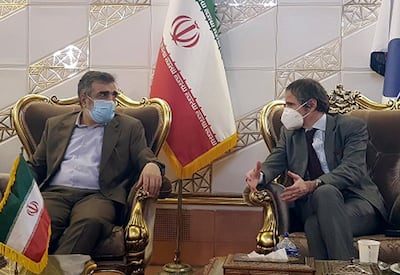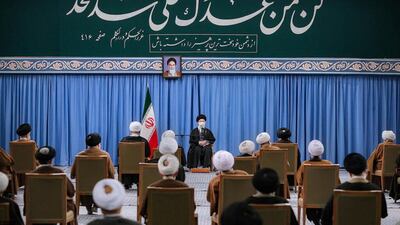US President Joe Biden has been in office for a little over a month. Already, Iran is trying to set the rules of engagement on its own terms.
On Monday, Iranian supreme leader, Ayatollah Ali Khamenei, threatened to accelerate his country's nuclear programme by enriching uranium of up to 60 per cent purity. It would need only 30 per cent more to make a nuclear weapon.
This is an aggressive move that Tehran has made proudly. Its parliament has also passed a law that bans snap inspections from UN nuclear observers, unless the US lifts sanctions.
Washington, thus far, appears to be going along with these antics. In the words of American officials, Iran's behaviour is "outrageous" and "concerning", but Mr Biden's lack of action to back up these words renders the US position contradictory. Instead, the administration wants to "extend and strengthen" an Obama-era nuclear deal.

The EU, in turn, said yesterday that the regime could return to the 2015 deal within the next few days. Many Arab countries, who live with the daily threat of Tehran's aggression, wonder how exactly President Biden aims to bolster an agreement that is fundamentally flawed.
One of the primary weaknesses in Mr Obama's deal with Iran was how little it did to limit its other malign activities. Since its inception in 1979, the regime in Tehran has used hostage-taking to get what it wants. The new US administration has openly stated that it seeks talks to secure the release of a number of captives. While this is absolutely something that should be addressed, by publicly expressing this American desire, Tehran, with a record for using any means necessary to secure its objectives, will be encouraged to complicate the release of innocent Americans, some dual citizens, in order to put pressure on President Biden.
The agreement also left Washington's allies in the Middle East vulnerable to attacks, even occupation, by Iranian proxies. A huge militia network, largely sponsored by Tehran, hampers Iraq's stability and prosperity. In this past week, militia groups have launched three separate missile attacks on targets in Iraq, and Iran-backed Houthi rebels in Yemen have repeatedly flown explosive-laden drones into Saudi Arabia.
Nonetheless, Washington appears committed to securing a deal with Tehran quickly. Some might be relieved by a more emollient American line, after the turbulence of the Trump administration's hawkish Iran policy. For those in Tehran's neighbourhood, however, Mr Biden's readiness to reward Iran's bad behaviour will be a real worry.
American threats of "reserving the right to respond" mean little if not backed up by action. This by no means has to entail open conflict. With its many regional allies, diplomatic heft, effective sanctions regime and an increasingly isolated adversary that is beset by internal economic problems and social discontent, the US must realise that it has a lot more leverage than it thinks or projects. Until Washington uses this leverage, Mr Khamenei's expansionist policies in the region will escalate with detrimental consequences.


